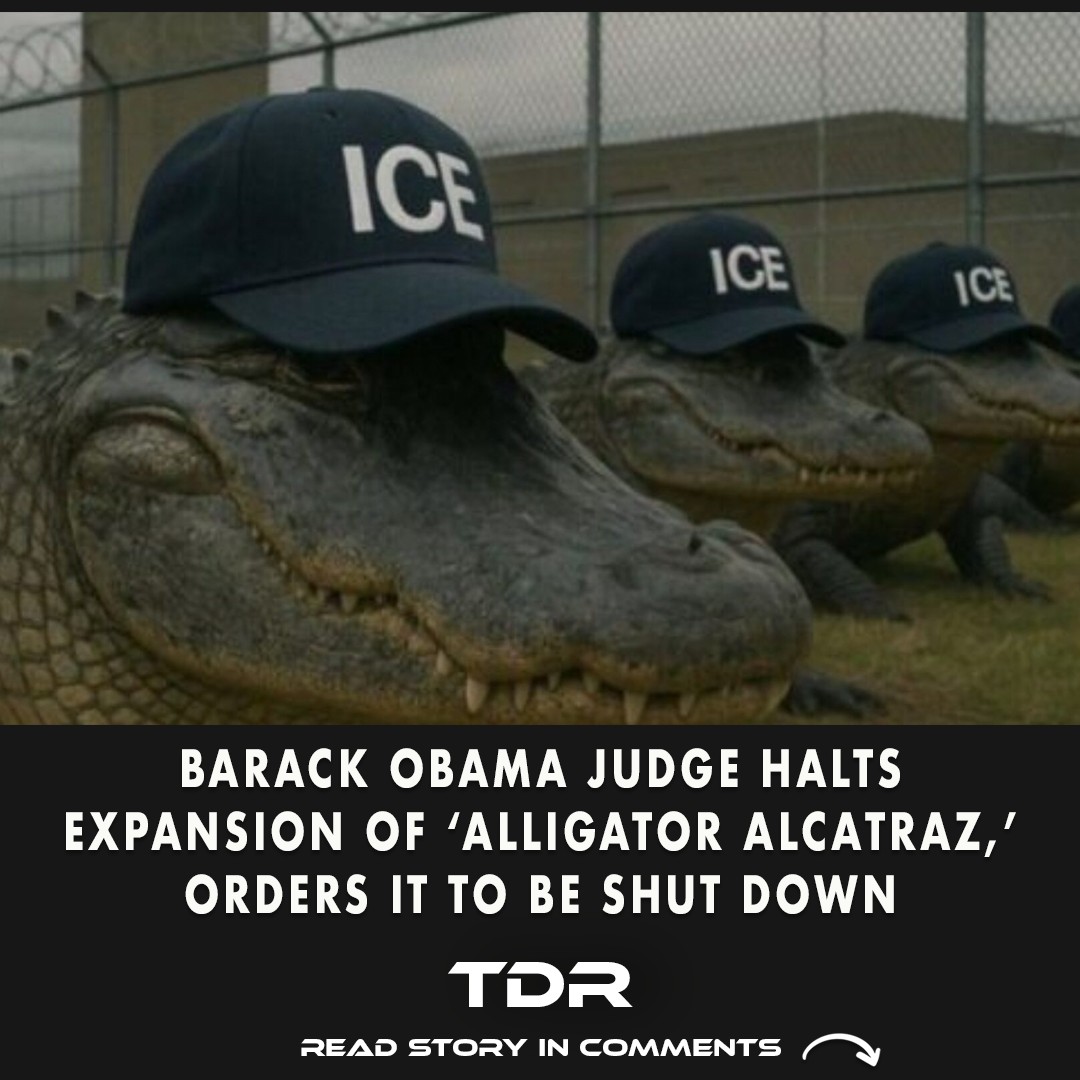Judge Halts Alligator Alcatraz Expansion, Citing Threat to Everglades
A major clash between immigration policy and environmental law has erupted in Florida after a federal judge issued an order halting all expansion at the controversial Alligator Alcatraz detention facility. The ruling, handed down Thursday, is a blow to Governor Ron DeSantis and President Donald Trump’s immigration enforcement agenda, which relied heavily on the site to house detainees.
The decision came after environmental groups and the Miccosukee tribe argued the project threatens endangered species and risks contaminating drinking water for millions of Floridians.
What the Judge Ordered
U.S. District Judge Kathleen Williams ruled that no new construction, paving, or expansion could take place at the Alligator Alcatraz site, located on an abandoned airfield in the Everglades. Temporary structures such as lights, fencing, and generators must be removed within 60 days. The state may continue to maintain housing for detainees already present but is barred from adding more beds or transferring additional detainees to the facility.
“This Order does nothing more than uphold the basic requirements of legislation designed to fulfill those promises,” Williams wrote, referencing decades of federal commitments to restore the Everglades.
Why This Matters
Florida officials have touted Alligator Alcatraz as a cornerstone of the state’s aggressive immigration crackdown. Earlier this year, the DeSantis administration deputized thousands of state officers to work alongside federal agents, positioning Florida as a leader in enforcing President Trump’s immigration agenda.
But environmentalists warned that the location—deep in the Everglades—posed an unacceptable risk to one of America’s most unique and fragile ecosystems. “The Everglades is not just a swamp—it’s the drinking water source for millions of people and home to endangered species,” said one attorney for the plaintiffs.
Bypassing Federal Reviews?
At the heart of the dispute is whether state officials violated federal law by skipping environmental impact reviews typically required for such projects. The lawsuit argued that Florida’s leaders ignored these safeguards in their rush to expand detention capacity.
The Miccosukee tribe, whose ancestral lands encompass parts of the Everglades, joined the suit, warning that unchecked construction could destroy habitat and cultural heritage sites.
State leaders countered that the site is a state-run facility, not subject to federal environmental mandates. The Trump administration had pledged to reimburse Florida for its costs, framing the effort as a national security measure rather than a state-only initiative.
A Broader Immigration Strategy
The Everglades facility is part of a larger network of detention centers being promoted by Republican-led states, including Indiana and Nebraska, in support of Trump’s immigration enforcement push. Alligator Alcatraz, however, became a flashpoint due to its location within an environmentally sensitive region long protected by bipartisan agreements.
The Judge’s Warning
In her ruling, Judge Williams emphasized the broader implications of ignoring environmental law:
“Allowing expansion without federal reviews undermines decades of work to restore and protect this unique ecosystem.”
She added that failure to comply could open the door to irreversible environmental damage, threatening both wildlife and human communities.
What Happens Next?
The state has not announced whether it will appeal the ruling, but legal experts expect further litigation. Meanwhile, construction crews have been ordered to halt operations immediately.
For immigration hardliners, the ruling represents a serious setback in the fight to expand detention capacity. For environmental advocates, it’s a historic victory that reaffirms the principle that political agendas cannot override ecological survival.
Other Legal Battles Loom
The detention site is also the subject of a separate lawsuit over detainees’ rights. That case, now split between federal courts, centers on whether detainees have access to confidential legal counsel. Judge Rodolfo Ruiz recently dismissed part of that case but allowed key arguments to proceed.
Political Fallout
The decision has political implications for both Governor DeSantis and President Trump. DeSantis had marketed Alligator Alcatraz as a symbol of Florida’s resistance to “open borders”, and Trump had praised the project as part of his national security agenda.
But the Everglades ruling underscores the tension between immigration enforcement and environmental stewardship—two issues that command passionate support within different voter blocs.
As one environmental advocate put it:
“The law is clear: you cannot bulldoze through federal protections for the Everglades, no matter who sits in the White House.”

James Jenkins is a celebrated Pulitzer Prize-winning author whose work has reshaped the way readers think about social justice and human rights in America. Raised in Atlanta, Georgia, James grew up in a community that instilled in him both resilience and a strong sense of responsibility toward others. After studying political science and creative writing at Howard University, he worked as a journalist covering civil rights issues before dedicating himself fully to fiction. His novels are known for their sharp, empathetic portraits of marginalized communities and for weaving personal stories with broader political realities. Jenkins’s breakout novel, Shadows of Freedom, won national acclaim for its unflinching look at systemic inequality, while his more recent works explore themes of identity, resilience, and the fight for dignity in the face of oppression. Beyond his novels, James is an active public speaker, lecturing at universities and participating in nonprofit initiatives that support literacy and community empowerment. He believes that storytelling is a way to preserve history and inspire change. When not writing, James enjoys jazz music, mentoring young writers, and traveling with his family to explore cultures and stories around the world.









